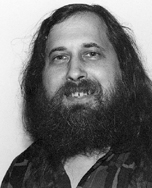 GNU
author and
FSF founder
Richard Stallman
GNU
author and
FSF founder
Richard Stallman
courtesy:
stallman.org
|
In today’s world
of intellectual property
disputes, mp3 music
swaping, and malicious
hacker attacks it can
be hard to imagine
the world of computing
that once was. Not
so long ago in one
of the nation’s
oldest cities in Massachusetts
and in a sleepy California
valley, computer gurus
were laying the groundwork
for what would be the
latter part of the
century’s most
influential revolution.
Across the nation
in university computer
labs, government agencies
and corporate think
tanks, programmers
created computer software,
innovated and revised
it. These digital
pioneers fondly called
themselves “hackers.”
Richard Stallman is
generally regarded
in the community as
the “philosopher” of
this era. He
considers himself among
the first of the original
hackers. These hackers
were not like those
of the movies that
attempt to illegally
procure secret files
or take down worldwide
financial networks.
“Most people
have a mistaken idea
of what we hackers
actually do and what
we think,” Stallman
says in one of his
numerous essays on
the subject.
For Stallman and the
early programmers “hacking” simply
meant plugging away
at computer code until
the program worked.
In the 1970s Stallman
worked for MIT at the
college’s Artificial
Intelligence Lab on
Unix machines. The
community of programmers
passed software around
the world freely, modified
one another’s
work, and shared in
the benefits of finely
tweaked projects.
By the early 1980s
corporate America began
to take notice of the
power of computers
and the potential market
for personal computing. As
the AI Lab project
was disbanded by MIT,
many of the programmers
went to work in the
commercial arena developing
software for the retail
market.
Richard Stallman was
and remains vehemently
opposed to the commercialization
of software. For
Stallman the AI Lab
was a utopia that worked. While
some of his colleagues
were refocusing their
efforts on software
for sale, Stallman
began formalizing a
project that would
keep software free. He
called his philosophy “Free
Software” and
dubbed the project “GNU” (pronounced “Guh-new”),
which stands for Gnu,
is Not Unix. Stallman
says that the “G” has
no meaning and is part
of the recursive acronym. The
GNU project grew into
Free
Software Foundation,
which Stallman officially
founded in 1984.
Stallman’s GNU
project remained an
incomplete operating
system until 1994 when
Linus Torvalds, independently
of the Free Software
Foundation, created
the first Unix-like
kernel (kernel is the
core of the operating
system software that
connects hardware to
software) under the
Free Software Foundation’s
GNU Public License
(GPL). Together
GNU and Linux form
a complete and open
source Unix compatible
operating system.
While the open source
community has embraced
Stallman’s GPL
as the standard license
for its releases, Stallman
has remained sharply
opposed to the combination
of the GPL with for-profit
business solutions. Stallman
believes that all software
should be free and
that the business of
software hurts further
development. He
remains committed to
the strict ideas of
Free Software, believing
that all software should
be free and that there
is no place for non-free
or proprietary software. For
him programmers should
ideally earn money
by being paid for their
time by employers to
develop open source
solutions for them
and in turn contribute
to the universe of
Free Software.
“Open source
is a development methodology;
free software is a
social movement,” Stallman
says in his book Free
Software Free Society:
Selected Essays of
Richard M. Stallman. “We
are not against the
open source movement,
but we (Free Software
movement members) don’t
want to be lumped in
with them.”
Open source-ers like
Bruce
Perens, the author
of the movement’s
official definition,
believe that free and
proprietary software
can co-exist. Perens,
the author of the Open
Source Definition,
called Stallman a great
philosopher but called
his ideas “utopian” and
attributed them to
Stallman’s lack
of success in the business
world.
“Richard came
in (to the open source
movement) in 1984 and
really tops any of
us,” said Perens
in an interview. “Unfortunately
there are a lot of
really strong-willed
people in the situation…and
I may never be able
to persuade us all
to be buddies.”
Stallman himself has
sharply criticized
Linus Torvalds, for
promoting the use of
the name “Linux” to
describe the software
package, which includes
GNU and its programs.
“When so many
people want me to call
the system ``Linux'',
how can I, who merely
launched its development,
not comply,” writes
Stallman on the FSF
Web site. “And
forcibly denying them
a speech is forcibly
making them unhappy.
That's coercion, as
bad as Microsoft!”
Stallman has repeatedly
suggested that Linux
and its components,
which include his GNU
software, be called
GNU/Linux.
“The whole GNU
Project is really one
big hack,” said
Stallman in the documentary
film Revolution
OS. “It
is one big act of playful
subversive playful
cleverness to change
society for the better…”
Richard Stallman
earned a BA in physics
from Harvard University
in 1974. He has
received many accolades
for his contribution
to computing including
the Grace Hopper award
from the Association
for Computing Machinery. In
1998 he received the
Electronic Frontier Foundation's
pioneer award along with
Linus Torvalds. |



































